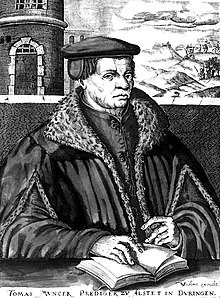Thomas Müntzer
| Thomas Müntzer | |
|---|---|

Thomas Müntzer, in a 1608 engraving by Christoffel Van Sichem.
|
|
| Born | 21 December? 1489 Stolberg, present-day Saxony-Anhalt |
| Died | 27 May 1525 (aged 35–36) Mühlhausen, present-day Thuringia |
| Occupation | preacher, theologian |
Thomas Müntzer (German pronunciation: [ˌtoːmas ˈmʏnt͡sɐ̯]; c. December 1489 – 27 May 1525) was a radical German preacher and theologian of the early Reformation whose opposition to both Luther and the Roman Catholic Church led to his open defiance of late-feudal authority in central Germany. Müntzer was foremost amongst those reformers who took issue with Luther’s compromises with feudal authority. He became a leader of the German peasant and plebeian uprising of 1525, was captured after the battle of Frankenhausen, and was tortured and executed.
Few other figures of the German Reformation have raised so much controversy —which continues to this day— as Müntzer. A complex and unique figure in history, he is now regarded as a significant player in the early years of the German Reformation and also in the history of European revolutionaries. Almost all modern studies of Müntzer stress the necessity of understanding his revolutionary actions as a consequence of his theology: Müntzer believed that the end of the world was imminent and that it was the task of the true believers to aid God in ushering in a new era of history Within the history of the Reformation, his contribution – especially in liturgy and Biblical exegesis – was of substance, but remains undervalued.
Thomas Müntzer was born in late 1489 (or possibly early 1490), in the small town of Stolberg in the Harz Mountains of Germany. The legend that his father had been executed by the feudal authorities has long since been shown untrue. There is every reason to suppose that Müntzer had a relatively comfortable background and upbringing – as evidenced by his lengthy education. Both his parents were still alive in 1520, his mother dying at around that time.
Soon after 1490 the family moved to the neighbouring and slightly larger town of Quedlinburg, and it was as ‘Thomas Munczer de Quedlinburgk’ that he enrolled at the university of Leipzig in 1506. Here he may have studied the Arts or even Theology: relevant records are missing, and it is uncertain whether Müntzer actually graduated from Leipzig. He later enrolled in late 1512 at the Viadriana university of Frankfurt an der Oder. It is not known what degrees he had obtained by 1514, when he found employment within the Church: almost certainly a bachelor's degree in theology and/or the arts; and possibly – but less certainly – a master of the arts. Again, the university records are full of holes, or are completely missing. At some time in this rather obscure period of his life, possibly before his studies at Frankfurt, he held down posts as an assistant teacher in schools in Halle and Aschersleben, at which time, according to his final confession, he is alleged to have formed a ‘league’ against the incumbent Archbishop of Magdeburg – to what end the league was formed is wholly unknown.
...
Wikipedia
